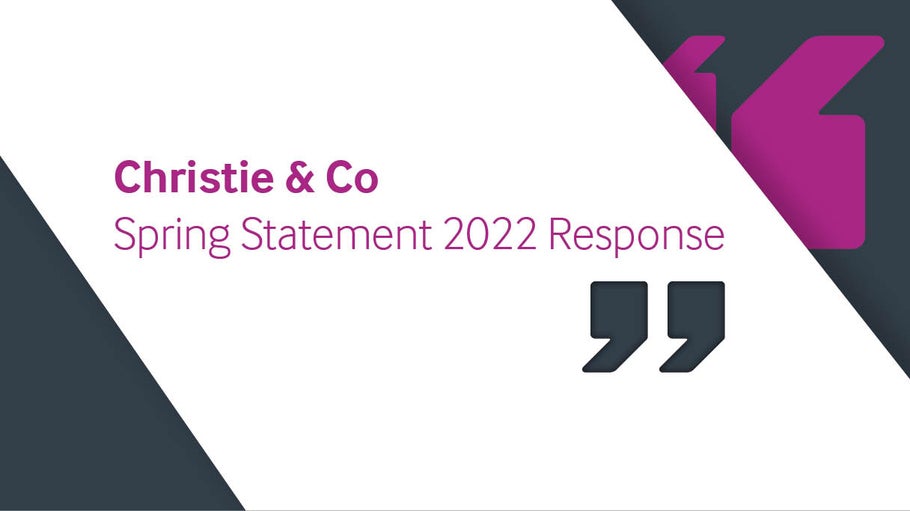Spring Statement 2022 Response
On Wednesday 23 March 2022, the Chancellor of the Exchequer, Rishi Sunak, presented his Spring Statement to Parliament, against a backdrop of the sharpest rise in the cost of living for decades.
Business. Built around You.
Your expert business property advisers

When Sunak delivered his Budget last October, he stated that the UK economy was expected to grow in 2022, with the worst of the pandemic now behind us. However, much has changed since then, with a general hike in oil and gas prices and inflation seeing energy and food prices rise, which is putting increasing amounts of pressure on households across the UK.
Official forecasts from the Office for Budget Responsibility (OBR) expect inflation to rise a further 7.4% this year and anticipate it will be 2024 before this is back under control.
Sunak announced three key measures to help mitigate this challenging situation:
- Fuel duty will be cut by 5p per litre until March 2023 (the biggest cut to all fuel duty rates ever)
- VAT relief on energy saving products for homes and businesses
- The household support fund will be doubled to £1bn and will be in place from April 2022
Other key measures announced that will come into effect throughout the year:
- The NI threshold will be increased by £3,000 to £12,570 from July 2022. This is a £6 billion tax cut for over 30 billion people across the country however the Health and Social Care Levy will remain in place
- A 50% business rate discount will begin in April
- The employment allowance will increase to £5,000 in April
- Sunak also promised that before the end of 2024 the basic rate of income tax will be cut from 20p to 19p in the pound
Disappointingly for the many businesses that we work with across our specialist sectors, the Chancellor’s immediate measures mainly focus on addressing the increasing cost burden on households and individuals but not a lot was announced to support businesses, who are also feeling the impacts of increasing energy and food prices.
See what our experts have to say in response...
Darren Bond, Global Managing Director:
“Whilst the Chancellor has clearly tried to negate some of the rising living costs in terms of fuel duty and National Insurance contributions, disappointingly he has missed an opportunity to support hospitality, one of the sectors most impacted by the pandemic, through measures such as a VAT freeze."
Carine Bonnejean, Managing Director – Hotels:
“The industry is deeply shocked and disappointed with the Chancellor’s lack of hospitality industry-specific support in his statement, as there were high hopes for the freeze of VAT at 12.5%, essentially ignoring the unprecedented cost and inflationary pressures that the industry is experiencing. The impact on our industry is likely to be immense, and many owners who are still feeling the effects of the pandemic may be unable to survive.”
Simon Chaplin, Senior Director – Pubs & Restaurants:
“Like most across the hospitality sector, we are gravely disappointed that the Chancellor failed to announce a freeze to VAT at 12.5% in today’s statement. This lack of ongoing support will create a major set-back for operators, who are still facing inflationary and rising staff, food and energy cost pressures, significant staff shortages, pandemic-related debt, and a severely outdated business rates system which is in dire need of reform. This is a further challenge to the industry which will cause many to review their position and may see a flurry of opportunities coming to the market this year.”
Steve Rodell, Managing Director – Retail:
“As petrol and diesel prices continue to rise, the cut to fuel duty will be a welcome relief to many families across the UK. However, the reality is it’s not going to help businesses to the same degree and ultimately, retailers may still be forced to pass increasing energy and food costs onto consumers.
The Chancellor’s announcement that VAT relief will be introduced for energy saving materials (ESMs) such as solar panels and insulation for properties is an interesting measure which should be contemplated by retailers. This will reduce the rate of VAT on ESMs from 5% to 0% from 1 April 2022 until 31 March 2027 so it would be sensible time for retail operators to consider investing in the fabric of their building and adding more energy efficient systems, to access this tax benefit and offset increasing costs.”